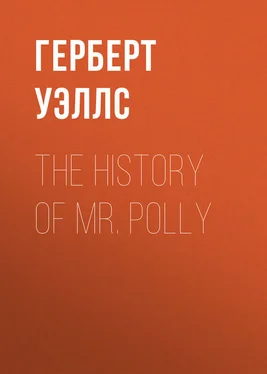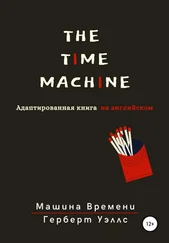Герберт Уэллс - The History of Mr. Polly
Здесь есть возможность читать онлайн «Герберт Уэллс - The History of Mr. Polly» — ознакомительный отрывок электронной книги совершенно бесплатно, а после прочтения отрывка купить полную версию. В некоторых случаях можно слушать аудио, скачать через торрент в формате fb2 и присутствует краткое содержание. Жанр: foreign_antique, foreign_prose, на английском языке. Описание произведения, (предисловие) а так же отзывы посетителей доступны на портале библиотеки ЛибКат.
- Название:The History of Mr. Polly
- Автор:
- Жанр:
- Год:неизвестен
- ISBN:нет данных
- Рейтинг книги:5 / 5. Голосов: 1
-
Избранное:Добавить в избранное
- Отзывы:
-
Ваша оценка:
- 100
- 1
- 2
- 3
- 4
- 5
The History of Mr. Polly: краткое содержание, описание и аннотация
Предлагаем к чтению аннотацию, описание, краткое содержание или предисловие (зависит от того, что написал сам автор книги «The History of Mr. Polly»). Если вы не нашли необходимую информацию о книге — напишите в комментариях, мы постараемся отыскать её.
The History of Mr. Polly — читать онлайн ознакомительный отрывок
Ниже представлен текст книги, разбитый по страницам. Система сохранения места последней прочитанной страницы, позволяет с удобством читать онлайн бесплатно книгу «The History of Mr. Polly», без необходимости каждый раз заново искать на чём Вы остановились. Поставьте закладку, и сможете в любой момент перейти на страницу, на которой закончили чтение.
Интервал:
Закладка:
The Three Ps took the utmost interest in each other and found no other company so good. They talked about everything in the world, and would go on talking in their dormitory after the gas was out until the other men were reduced to throwing boots; they skulked from their departments in the slack hours of the afternoon to gossip in the packing-room of the warehouse; on Sundays and Bank holidays they went for long walks together, talking.
Platt was white-faced and dark, and disposed to undertones and mystery and a curiosity about society and the demi-monde . He kept himself au courant by reading a penny paper of infinite suggestion called Modern Society . Parsons was of an ampler build, already promising fatness, with curly hair and a lot of rolling, rollicking, curly features, and a large blob-shaped nose. He had a great memory and a real interest in literature. He knew great portions of Shakespeare and Milton by heart, and would recite them at the slightest provocation. He read everything he could get hold of, and if he liked it he read it aloud. It did not matter who else liked it. At first Mr. Polly was disposed to be suspicious of this literature, but was carried away by Parsons’ enthusiasm. The Three Ps went to a performance of “Romeo and Juliet” at the Port Burdock Theatre Royal, and hung over the gallery fascinated. After that they made a sort of password of: “Do you bite your thumbs at Us, Sir?”
To which the countersign was: “We bite our thumbs.”
For weeks the glory of Shakespeare’s Verona lit Mr. Polly’s life. He walked as though he carried a sword at his side, and swung a mantle from his shoulders. He went through the grimy streets of Port Burdock with his eye on the first floor windows – looking for balconies. A ladder in the yard flooded his mind with romantic ideas. Then Parsons discovered an Italian writer, whose name Mr. Polly rendered as “Bocashieu,” and after some excursions into that author’s remains the talk of Parsons became infested with the word “ amours ,” and Mr. Polly would stand in front of his hosiery fixtures trifling with paper and string and thinking of perennial picnics under dark olive trees in the everlasting sunshine of Italy.
And about that time it was that all Three Ps adopted turn-down collars and large, loose, artistic silk ties, which they tied very much on one side and wore with an air of defiance. And a certain swashbuckling carriage.
And then came the glorious revelation of that great Frenchman whom Mr. Polly called “Rabooloose.” The Three Ps thought the birth feast of Gargantua the most glorious piece of writing in the world, and I am not certain they were wrong, and on wet Sunday evenings where there was danger of hymn singing they would get Parsons to read it aloud.
Towards the several members of the Y. M. C. A. who shared the dormitory, the Three Ps always maintained a sarcastic and defiant attitude.
“We got a perfect right to do what we like in our corner,” Platt maintained. “You do what you like in yours.”
“But the language!” objected Morrison, the white-faced, earnest-eyed improver, who was leading a profoundly religious life under great difficulties.
“ Language , man!” roared Parsons, “why, it’s Literature!”
“Sunday isn’t the time for Literature.”
“It’s the only time we’ve got. And besides – ”
The horrors of religious controversy would begin…
Mr. Polly stuck loyally to the Three Ps, but in the secret places of his heart he was torn. A fire of conviction burnt in Morrison’s eyes and spoke in his urgent persuasive voice; he lived the better life manifestly, chaste in word and deed, industrious, studiously kindly. When the junior apprentice had sore feet and homesickness Morrison washed the feet and comforted the heart, and he helped other men to get through with their work when he might have gone early, a superhuman thing to do. Polly was secretly a little afraid to be left alone with this man and the power of the spirit that was in him. He felt watched.
Platt, also struggling with things his mind could not contrive to reconcile, said “that confounded hypocrite.”
“He’s no hypocrite,” said Parsons, “he’s no hypocrite, O’ Man. But he’s got no blessed Joy de Vive; that’s what’s wrong with him. Let’s go down to the Harbour Arms and see some of those blessed old captains getting drunk.”
“Short of sugar, O’ Man,” said Mr. Polly, slapping his trouser pocket.
“Oh, carm on,” said Parsons. “Always do it on tuppence for a bitter.”
“Lemme get my pipe on,” said Platt, who had recently taken to smoking with great ferocity. “Then I’m with you.”
Pause and struggle.
“Don’t ram it down, O’ Man,” said Parsons, watching with knitted brows. “Don’t ram it down. Give it Air. Seen my stick, O’ Man? Right O.”
And leaning on his cane he composed himself in an attitude of sympathetic patience towards Platt’s incendiary efforts.
IV
Jolly days of companionship they were for the incipient bankrupt on the stile to look back upon.
The interminable working hours of the Bazaar had long since faded from his memory – except for one or two conspicuous rows and one or two larks – but the rare Sundays and holidays shone out like diamonds among pebbles. They shone with the mellow splendour of evening skies reflected in calm water, and athwart them all went old Parsons bellowing an interpretation of life, gesticulating, appreciating and making appreciate, expounding books, talking of that mystery of his, the “Joy de Vive.”
There were some particularly splendid walks on Bank holidays. The Three Ps would start on Sunday morning early and find a room in some modest inn and talk themselves asleep, and return singing through the night, or having an “argy bargy” about the stars, on Monday evening. They would come over the hills out of the pleasant English country-side in which they had wandered, and see Port Burdock spread out below, a network of interlacing street lamps and shifting tram lights against the black, beacon-gemmed immensity of the harbour waters.
“Back to the collar, O’ Man,” Parsons would say. There is no satisfactory plural to O’ Man, so he always used it in the singular.
“Don’t mention it,” said Platt.
And once they got a boat for the whole summer day, and rowed up past the moored ironclads and the black old hulks and the various shipping of the harbour, past a white troopship and past the trim front and the ships and interesting vistas of the dockyard to the shallow channels and rocky weedy wildernesses of the upper harbour. And Parsons and Mr. Polly had a great dispute and quarrel that day as to how far a big gun could shoot.
The country over the hills behind Port Burdock is all that an old-fashioned, scarcely disturbed English country-side should be. In those days the bicycle was still rare and costly and the motor car had yet to come and stir up rural serenities. The Three Ps would take footpaths haphazard across fields, and plunge into unknown winding lanes between high hedges of honeysuckle and dogrose. Greatly daring, they would follow green bridle paths through primrose studded undergrowths, or wander waist deep in the bracken of beech woods. About twenty miles from Port Burdock there came a region of hop gardens and hoast crowned farms, and further on, to be reached only by cheap tickets at Bank Holiday times, was a sterile ridge of very clean roads and red sand pits and pines and gorse and heather. The Three Ps could not afford to buy bicycles and they found boots the greatest item of their skimpy expenditure. They threw appearances to the winds at last and got ready-made workingmen’s hob-nails. There was much discussion and strong feeling over this step in the dormitory.
Читать дальшеИнтервал:
Закладка:
Похожие книги на «The History of Mr. Polly»
Представляем Вашему вниманию похожие книги на «The History of Mr. Polly» списком для выбора. Мы отобрали схожую по названию и смыслу литературу в надежде предоставить читателям больше вариантов отыскать новые, интересные, ещё непрочитанные произведения.
Обсуждение, отзывы о книге «The History of Mr. Polly» и просто собственные мнения читателей. Оставьте ваши комментарии, напишите, что Вы думаете о произведении, его смысле или главных героях. Укажите что конкретно понравилось, а что нет, и почему Вы так считаете.

![Герберт Уэллс - The War of the Worlds [С англо-русским словарем]](/books/26611/gerbert-uells-the-war-of-the-worlds-s-anglo-thumb.webp)










